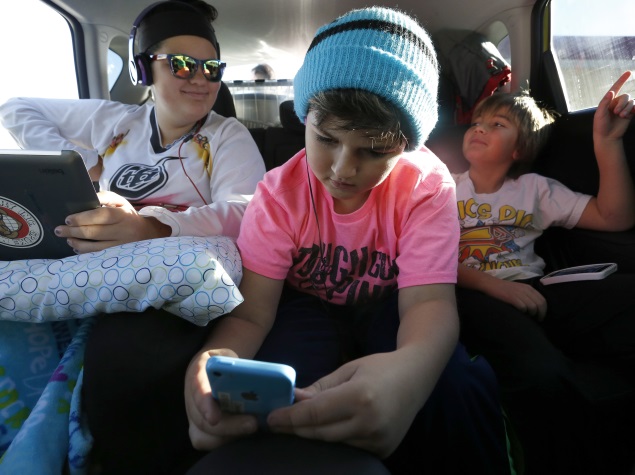Children's Mobile Apps Still Collect Information, Claims Privacy Grade

Whether they pass that information on to retailers or seek parental consent first - as required by law - isn't entirely clear. But U.S. parents who don't want their family tracked online by fast food chains, toy stores or other retailers have limited choices: Stick the phone in "airplane mode" to shut off the wireless connection and risk losing functionality, or wade through a developer's privacy policy to make sure you're OK with it.
"Kids are such a lucrative market, especially for apps," said Jeff Chester, executive director of the Center for Digital Democracy. "Unfortunately, there are still companies out there that are more concerned about generating revenue than protecting the privacy of kids."
Americans have traded vast amounts of personal data in exchange for the ease and functionality of fun mobile applications on their phones. But how is industry using that information?
Chester and other consumer advocates allege that fast food chains are increasingly focusing advertising dollars on digital media, targeting blacks and Hispanics. They also warn that data from phones can be combined with offline information like home prices, race or income in ways that could violate fair lending laws. And a new site, PrivacyGrade.org, found that many popular kids' apps like Talking Tom and Fruit Ninja collect information in ways parents wouldn't necessarily expect.
Concerned in particular about industries' focus on kids online, the Federal Trade Commission in July 2013 now requires app developers to get parental consent before collecting personal data on anyone younger than 13.
"It's upped the ante for companies deciding whether they are going to market to kids," said Michelle De Mooy of the Center for Democracy and Technology. "And that's a good thing."
But with the number of smartphones expected to reach 3.5 billion in the next five years, according to Forrester Research, the mobile app and advertising industry has exploded. Regulators don't have an easy, automated way of analyzing the hundreds of mobile apps popping up each day.
Since the updated regulation went into effect, the FTC has brought about only two enforcement actions against mobile apps. In September, the commission announced that Yelp agreed to pay $450,000 and TinyCo. $300,000 to settle separate charges that their companies knowingly collected information on young children through their mobile apps.
" According to PrivacyGrade.org, which is run by computer scientists at Carnegie Mellon University, scores of apps that collect information are still aimed at kids.
For example, Fruit Ninja collects a phone's location, which could be passed on to advertisers. And Talking Tom, where kids can talk to and "tickle" an alley cat using the touch screen, collects a child's audio recordings.
Outfit7, the developer behind Talking Tom, said in a statement that personal information and recordings are never shared with advertisers and the app complies with regulations "to distinguish adults from minors and restrict sharing on social media."
Halfbrick Studios, which developed Fruit Ninja, said in a statement that it planned to release updates to Fruit Ninja and other apps to increase privacy protections.
Jason Hong, who runs PrivacyGrade.org, says it's hard to know exactly what developers are doing with the information they collect. Hong said he thinks the government should devote more resources to evaluating popular apps and working with developers to promote basic privacy standards.
"It's part of a long conversation about what is privacy," he said.Get your daily dose of tech news, reviews, and insights, in under 80 characters on Gadgets 360 Turbo. Connect with fellow tech lovers on our Forum. Follow us on X, Facebook, WhatsApp, Threads and Google News for instant updates. Catch all the action on our YouTube channel.
Related Stories
- Samsung Galaxy Unpacked 2026
- iPhone 17 Pro Max
- ChatGPT
- iOS 26
- Laptop Under 50000
- Smartwatch Under 10000
- Apple Vision Pro
- Oneplus 12
- OnePlus Nord CE 3 Lite 5G
- iPhone 13
- Xiaomi 14 Pro
- Oppo Find N3
- Tecno Spark Go (2023)
- Realme V30
- Best Phones Under 25000
- Samsung Galaxy S24 Series
- Cryptocurrency
- iQoo 12
- Samsung Galaxy S24 Ultra
- Giottus
- Samsung Galaxy Z Flip 5
- Apple 'Scary Fast'
- Housefull 5
- GoPro Hero 12 Black Review
- Invincible Season 2
- JioGlass
- HD Ready TV
- Latest Mobile Phones
- Compare Phones
- Tecno Pova Curve 2 5G
- Lava Yuva Star 3
- Honor X6d
- OPPO K14x 5G
- Samsung Galaxy F70e 5G
- iQOO 15 Ultra
- OPPO A6v 5G
- OPPO A6i+ 5G
- Asus Vivobook 16 (M1605NAQ)
- Asus Vivobook 15 (2026)
- Brave Ark 2-in-1
- Black Shark Gaming Tablet
- boAt Chrome Iris
- HMD Watch P1
- Haier H5E Series
- Acerpure Nitro Z Series 100-inch QLED TV
- Asus ROG Ally
- Nintendo Switch Lite
- Haier 1.6 Ton 5 Star Inverter Split AC (HSU19G-MZAID5BN-INV)
- Haier 1.6 Ton 5 Star Inverter Split AC (HSU19G-MZAIM5BN-INV)







![[Partner Content] OPPO Reno15 Series: AI Portrait Camera, Popout and First Compact Reno](https://www.gadgets360.com/static/mobile/images/spacer.png)









